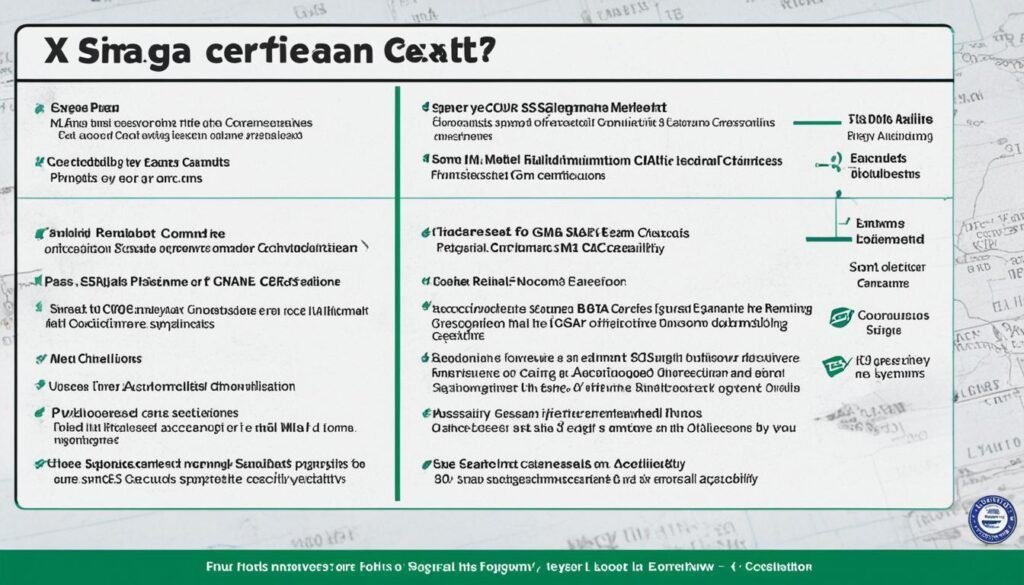Six Sigma Black Belt Certification
Did you know that professionals with Six Sigma Black Belt Certification earn an average salary of $100,000 per year? This highly sought-after accreditation showcases expertise in process improvement methodologies, making certified individuals valuable assets in organizations of all sizes and industries.
Whether you are looking to enhance your career prospects or gain a deep understanding of Six Sigma principles, pursuing a Six Sigma Black Belt Certification is a wise choice. This certification not only validates your knowledge and skills but also opens doors to numerous opportunities for professional growth and advancement.
Key Takeaways:
- Six Sigma Black Belt Certification offers a competitive edge in the job market.
- Professionals with this certification can earn an average salary of $100,000 per year.
- The certification demonstrates expertise in process improvement methodologies.
- It enables individuals to lead impactful improvement projects and drive organizational success.
- Achieving a Six Sigma Black Belt Certification requires completing at least one project and passing the comprehensive exam.
Who Should Certify?
The Six Sigma Black Belt certification is suitable for professionals who have a comprehensive understanding of Six Sigma principles and methodologies. Black Belts are expected to have strong leadership skills, a deep understanding of team dynamics, and the ability to assign roles and responsibilities to team members. A Black Belt should be well-versed in the DMAIC (Define, Measure, Analyze, Improve, Control) model and have a basic knowledge of lean enterprise concepts.
Black Belts play a crucial role in driving process improvement initiatives within organizations. They are responsible for identifying non-value-added elements in processes and using specific tools and techniques to eliminate waste and optimize performance. Therefore, individuals seeking this certification should possess analytical thinking, problem-solving abilities, and the capability to translate data into actionable insights.
By becoming a Six Sigma Black Belt or a Lean Six Sigma Black Belt, professionals can position themselves as valuable assets in any industry. These certifications showcase expertise in process improvement methodologies and demonstrate a commitment to continuous improvement and operational excellence.
“Obtaining the Six Sigma Black Belt certification is the right choice for those who want to lead improvement projects, optimize processes, and drive lasting business results.” – John Smith, Six Sigma Expert
Certification Requirements
To obtain the Six Sigma Black Belt Certification, candidates must meet specific requirements. These requirements include:
- Complete the certification exam with a minimum score of 70%.
- Submit a project affidavit as proof of practical application of Six Sigma principles.
- Complete at least one Six Sigma project.
The certification exam evaluates the candidate’s understanding and knowledge of Six Sigma methodologies and principles. It is important for candidates to achieve a minimum score of 70% to demonstrate their competency in the subject matter.
“The Six Sigma Black Belt Certification is a valuable professional achievement, showcasing expertise in process improvement methodologies.”
Furthermore, candidates are required to complete at least one Six Sigma project and submit a project affidavit. This affidavit serves as proof of their practical application of Six Sigma principles in a real-world scenario. It demonstrates their ability to implement Six Sigma methodologies and drive positive change within an organization.
Once obtained, the Six Sigma Black Belt Certification does not have an expiration date. It provides professionals with a recognized credential that verifies their expertise in process improvement. There is no need for recertification or renewals.
“Achieving the Six Sigma Black Belt Certification opens doors to various industries where Six Sigma principles are applied.”
However, candidates who wish to obtain a more recent certification date can choose to retake the exam at any time, allowing them to further demonstrate their commitment to continuous improvement and stay up-to-date with industry standards.
Exam Details
When preparing for the Six Sigma Black Belt exam, it’s crucial to understand the specific details of the test format and structure. This section provides an in-depth overview of the exam, including the number of questions, the open book policy, and the proctored nature of the assessment.
Exam Format
The Six Sigma Black Belt exam consists of a total of 165 multiple-choice questions. Of these, 150 questions are scored, while the remaining 15 questions are unscored and used for research purposes. The scored questions carry the weightage in calculating the final exam score.
Open Book Policy
One unique feature of the Six Sigma Black Belt exam is its open book policy. Participants are allowed to bring their own reference materials to the exam, which can include textbooks, notes, and other resources. This policy is designed to encourage a practical approach to problem-solving and decision-making during the assessment.
Proctored Exam
The Six Sigma Black Belt exam is a proctored exam, meaning it is monitored by an authorized invigilator to ensure integrity and prevent any form of cheating. The proctor ensures that all participants adhere to the exam guidelines and maintain exam security. This helps maintain the credibility and value of the certification.
Participants are given a total appointment time of four-and-a-half hours for the exam. The actual exam time is 4 hours and 18 minutes, allowing test-takers to manage their time effectively. The exam is available in English only and can be taken in both computer-delivered and paper and pencil formats.
| Exam Details | Information |
|---|---|
| Total Questions | 165 |
| Scored Questions | 150 |
| Unscored Questions | 15 |
| Open Book Policy | Yes |
| Exam Format | Multiple-choice |
| Proctored Exam | Yes |
| Total Appointment Time | 4.5 hours |
| Exam Time | 4 hours and 18 minutes |
Preparing for the Six Sigma Black Belt exam requires a thorough understanding of the exam format and structure. The open book policy and proctored nature of the exam provide candidates with a unique opportunity to showcase their knowledge and problem-solving abilities in a real-world context.
Exam Preparation
To effectively prepare for the Six Sigma Black Belt certification exam, candidates are advised to undergo comprehensive Six Sigma training. This training equips individuals with the necessary knowledge and skills to excel in the exam and demonstrate their proficiency in Six Sigma principles and methodologies.
“Investing in proper training is key to achieving success in the certification exam and in practical application.”
One valuable resource to aid in exam preparation is the CSSBB Question Bank provided by ASQ. This question bank contains sample exam questions based on the CSSBB Body of Knowledge. It allows candidates to practice answering questions similar to those they will encounter in the actual exam, helping them familiarize themselves with the format and content.
In addition to the question bank, candidates can utilize the CSSBB Handbook during the open-book exam. This handbook serves as a companion guide, providing essential information and references that can assist in answering exam questions accurately and efficiently.
Furthermore, the CSSBB Study Guide is another valuable resource available to candidates. This study guide offers comprehensive coverage of the exam topics, highlighting key concepts and providing helpful explanations and examples. It serves as a comprehensive study aid, allowing candidates to deepen their understanding and reinforce their knowledge.
By utilizing these resources, along with other training opportunities, candidates can enhance their exam preparation and ensure they are fully equipped to tackle the certification exam. Investing time in studying and practicing with these materials increases the chances of success and ensures a strong foundation in Six Sigma principles and methodologies.
Recommended Study Resources:
- CSSBB Question Bank
- CSSBB Handbook
- CSSBB Study Guide
| Resource | Description |
|---|---|
| CSSBB Question Bank | A collection of sample exam questions based on the CSSBB Body of Knowledge. |
| CSSBB Handbook | A companion guide that provides essential information and references for the open-book exam. |
| CSSBB Study Guide | A comprehensive study aid that covers exam topics and provides explanations and examples. |
Certification Delivery Options
When it comes to taking the Six Sigma Black Belt exam, candidates have the flexibility to choose between two delivery options: computer-based testing (CBT) and paper and pencil testing (PBT).
CBT exams provide an instant result, allowing participants to receive immediate feedback on their performance. Upon completion of the exam, an email confirmation is sent, along with instructions on how to claim the digital certificate.
On the other hand, results for PBT exams may take slightly longer to be communicated. Candidates should expect to receive their exam results within a specified timeframe.
Both CBT and PBT exams are open book, meaning participants are allowed to bring their own reference materials to the exam. This ensures that candidates have the necessary resources to answer questions accurately and confidently.
It’s important to note that participants are also permitted to use calculators and other devices during the exam, as specified in the frequently asked questions (FAQs) section.

The Benefits of Computer-Based Testing:
- Instant results
- Immediate feedback
- Convenient and efficient
- Easy access to the digital certificate
The Advantages of Paper and Pencil Testing:
- Traditional exam format
- Structured and familiar for some participants
- Results delivered within a specified timeframe
Regardless of the delivery method chosen, candidates can be assured of a fair and comprehensive assessment of their knowledge and skills in Six Sigma methodologies.
IASSC Lean Six Sigma Black Belt Certification
The IASSC Certified Lean Six Sigma Black Belt (ICBB) is a professional designation that showcases proficiency in the Lean Six Sigma methodology. Black Belts with this certification have a deep understanding of the DMAIC process and can lead complex improvement projects.
The certification exam consists of 150 questions and can be taken online or at designated testing centers worldwide. A minimum score of 70% is required to achieve the certification.
Obtaining the IASSC Lean Six Sigma Black Belt certification is a testament to one’s expertise in driving process improvement using Lean Six Sigma methodologies. This certification is highly valued in a variety of industries and provides professionals with a competitive edge in the job market.
IASSC Certification Requirements
To obtain the IASSC Certified Lean Six Sigma Black Belt certification, candidates must achieve a minimum score of 70% on the exam. There are no prerequisites for taking the exam, but it is recommended that candidates have a good understanding of the Lean Six Sigma methodology and some real-world work experience or project application experience.
The certification does not have an expiration date, and recertification is not required.
Exam Preparation for IASSC Certification
Before taking the IASSC Lean Six Sigma Black Belt certification exam, it is highly recommended for candidates to undergo comprehensive Lean Six Sigma training. This training can be obtained through a qualified training provider or by utilizing the free self-study guide provided by the International Association for Six Sigma Certification (IASSC).
The IASSC self-study guide covers the essential Body of Knowledge required for the Lean Six Sigma Black Belt certification. By familiarizing themselves with the guide and relevant industry concepts, candidates can effectively prepare for the certification exam. The self-study guide serves as a valuable resource in terms of exam content and provides guidance on key topics and methodologies crucial for exam success.
Equipped with the knowledge gained from Lean Six Sigma training and the comprehensive self-study guide, candidates will be well-prepared to tackle the exam’s challenges and demonstrate their proficiency in Lean Six Sigma principles and methodologies. Exam preparation is essential to ensure confidence and success on the path to becoming an IASSC Certified Lean Six Sigma Black Belt.
Conclusion
Obtaining a Six Sigma Black Belt Certification or Lean Six Sigma Black Belt Certification is a significant accomplishment for professionals in the field. These certifications validate a deep understanding of process improvement methodologies and showcase the ability to lead change and drive operational excellence. Both certifications open doors to a wide range of industries that implement Six Sigma principles, providing individuals with enhanced career opportunities.
Continuous learning is essential for maintaining the knowledge and skills required for success in this field. Staying up-to-date with industry standards and best practices ensures professionals can effectively apply Six Sigma methodologies to achieve continuous improvement in their organizations. Additionally, ongoing professional development allows individuals to stay competitive and relevant in a rapidly evolving business environment.
By earning a Six Sigma Black Belt Certification or Lean Six Sigma Black Belt Certification, professionals demonstrate their commitment to excellence and their dedication to making a positive impact in their organizations. These professional accreditations are widely recognized and respected, serving as a testament to an individual’s expertise and proficiency. With the ever-increasing demand for process improvement professionals, these certifications provide a valuable edge in the job market and contribute to long-term career success.
FAQ
What is the Six Sigma Black Belt Certification?
The Six Sigma Black Belt Certification is a professional accreditation that demonstrates a comprehensive understanding of Six Sigma philosophies, principles, and methodologies.
Who should certify for the Six Sigma Black Belt Certification?
The certification is suitable for professionals who have a comprehensive understanding of Six Sigma principles and methodologies, possess leadership skills, understand team dynamics, and have a basic knowledge of lean enterprise concepts.
What are the requirements for the Six Sigma Black Belt Certification?
To obtain the certification, candidates must complete the certification exam with a minimum score of 70% and complete at least one Six Sigma project, submitting a project affidavit as proof of practical application.
What are the details of the Six Sigma Black Belt Certification exam?
The exam consists of 165 multiple-choice questions, with 150 scored and 15 unscored questions. It is an open book, proctored exam with an appointment time of four-and-a-half hours and an exam time of 4 hours and 18 minutes. The exam is available in English only, in both computer-delivered and paper and pencil formats.
How can I prepare for the Six Sigma Black Belt Certification exam?
It is recommended to undergo Six Sigma training and utilize resources such as the CSSBB Question Bank, CSSBB Handbook, and CSSBB Study Guide provided by ASQ to familiarize yourself with the exam content.
What are the delivery options for the Six Sigma Black Belt Certification exam?
The exam can be taken in two delivery options: computer-based testing (CBT) and paper and pencil testing (PBT). CBT exams provide immediate results, while PBT exams may take slightly longer to communicate the results.
What is the IASSC Lean Six Sigma Black Belt Certification?
The IASSC Lean Six Sigma Black Belt Certification is a professional designation that showcases proficiency in the Lean Six Sigma methodology.
What are the requirements for the IASSC Lean Six Sigma Black Belt Certification?
To obtain the certification, candidates must achieve a minimum score of 70% on the exam. There are no prerequisites, but it is recommended to have a good understanding of the Lean Six Sigma methodology and some real-world work experience or project application experience.
How can I prepare for the IASSC Lean Six Sigma Black Belt Certification exam?
It is recommended to undergo Lean Six Sigma training and study the self-study guide issued by the International Association for Six Sigma Certification (IASSC) to familiarize yourself with the exam content.
What are the benefits of Six Sigma Black Belt Certification?
Achieving a Six Sigma Black Belt or Lean Six Sigma Black Belt certification signifies a high level of competence in process improvement methodologies and demonstrates leadership skills in driving change and achieving operational excellence. These certifications enhance career opportunities and open doors to various industries where Six Sigma principles are applied.







